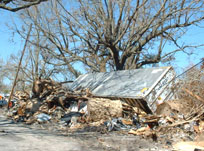Editor’s note: This is the first of a three-part series highlighting Loyola community members who have been particularly affected by Hurricane Katrina and its aftermath.
There was no reason to think the house wouldn’t survive. It had, after all, weathered the wrath of Hurricane Camille and the six feet of storm surge that sloshed in with it.
And so on the day before Katrina, when Nancy Dupont picked up her parents from their coastal house in Gulfport, Miss., she never imagined it would be the last time she looked at her childhood home.
“My feeling was we had actually seen the worst,” said Dupont, who is an associate professor of communications and head of the broadcast journalism sequence. “They called Camille a hundred-year storm, which meant that it would be the worst that you
would ever see. That was my feeling – that it would probably be battered, messed up, maybe flooded. But never in my wildest dreams did I think I was saying goodbye.”
Growing up on the sprawling ranch house, 50 or 60 yards from the beach, Dupont’s childhood and adolescence were played out on the beach and her small neighborhood, which stretched five blocks out from the water.
“My life growing up was the beach. I went out in boats and I sailed, and I swam, and those are still my favorite things to do. … My church was on the beach, all of my schools were on the beach.”
During her senior year of high school in 1969, Hurricane Camille struck and devastated the town.
“At first after Camille, [people] were devastated and wondering what they could do with their lives … It was quite tragic; there were a family of five killed just three doors
down,” Dupont recalls. “It was a very, very sad time. It definitely affected my senior
year of high school – Camille was everywhere.”
Her parents, like most in the town, decided to stay and rebuild. Like many New Orleanians today, they “stripped their house down to the studs.”
And so, on a Sunday morning thirty-six years later, Dupont and her parents, like everyone impacted by Katrina, had no idea of what the storm would do.
“My father took his important papers, his insurance papers, as he always did when he left the house,” she said. “But nobody really grabbed anything (or) got a sense of this was the last time.”
She evacuated with her husband and parents to her uncle’s home in Hattiesburg, Miss. Although Hattiesburg is 60 miles from the ocean, it still suffered hurricane-force winds that knocked out power, water and telephone services. Getting information via radio, the group learned of Gulfport’s condition.
“We pretty much knew Monday night,” she said. “We held out hope, but … they kept describing it as the scene of devastation, much worse than Camille, and that the entire
town … had been destroyed.”
Returning with her father a week after the storm, Dupont found that Gulfport was indeed utterly devastated. After signing waivers from the Environmental Protection Agency, she was finally able to see the remains of her parent’s home.
“There were four tractor trailers from the port of Gulfport on top of the house. It was smashed to the ground,” she said. “Not only that, but one of the tractor trailers had contained poultry, and the unfrozen chickens were all over the ground. There were pork bellies that had spilled from the containers; they were all over the ground.”
Her parent’s next door neighbors had died, along with five people from a condominium on the next block.
With her parents, both in their eighties, now homeless, Dupont struggled to help them find a home.
“We spent an awful lot of time with them after the storm trying to figure out what they were going to do. It’s not a decision you can put off when you have nowhere to live,” she said.
Eventually, they all moved to New Orleans, where Dupont returned to her undamaged Uptown home. Because her mother uses a wheelchair, her parents were unable to move into Dupont’s house. Instead, they purchased property nearby.
“They had saved for a rainy day, and the rainy day came. They could take care of themselves,” Dupont said. “My heart goes out to people that don’t have that option; it’s just heartbreaking.”
Now, Dupont finds herself shifting between responsibilities; she says a combination of an increased workload at Loyola and caring for her parents has left her exhausted.
“For my parents, to watch them, at their age, struggling to start from nothing has been just devastating. And I think it’s a very common situation in New Orleans,” she said.
But despite everything, she said she considers herself fortunate.
“There’s many, many things I’m grateful for,” she said. “That my parents had some money in the bank to recover … that my house in New Orleans is fine.”
Although she said she’s a long way from feeling normal, she has hopes for what will come in the next year.
“I hope that all of us can get some perspective on it as time goes by, and days go by, and we become more successful in dealing with it. I hope that we will begin to see that faith is restored, and despair does fade and that we can go on and rebuild new lives, but I don’t think that can be forced on anybody. It comes with time and it comes with individual struggle, and I think if you expect it too soon, you’re being unrealistic. This has been a disaster of tremendous proportions, beyond the scope of the human mind, and I think we need time.”
Kelly Brown can be reached at [email protected].

Nancy Dupont teaches one of her communications classes.








